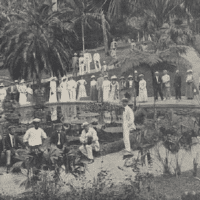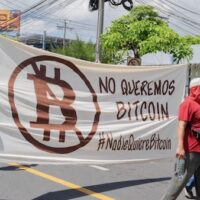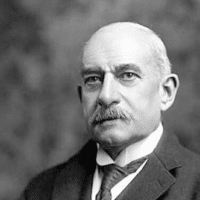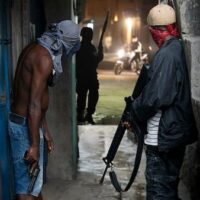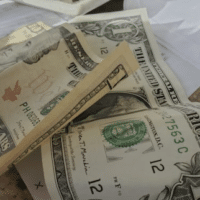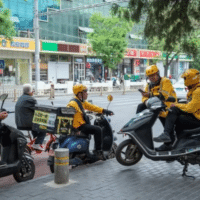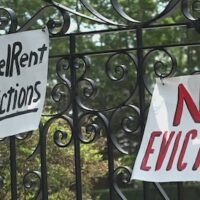-
Is public investment holding up global capitalism’s dynamism?
Capitalism is supposed to be all about economic growth, through the dynamism that is created by competition. This growth is meant to be driven by investment (or accumulation) which, in turn, is used to justify the shares of national income that are delivered to private profits, to the owners of capital.
-
A short, sordid history of brands and warfare
Burger King’s foray into recent conflict in Azerbaijan is part of a historical trend of corporations weighing in–and benefitting from–conflict, writes Tommy Hodgson
-
Salvadorans reject the adoption of Bitcoin as national currency
Many fear that the volatility of the cryptocurrency will affect their income and purchasing power. They condemned that it is not suitable for small vendors and only benefits the big investors and transnational companies.
-
How the U.S. came to dominate Haiti: seizing the gold
The Banque Nationale d’Haiti (BNH) was housed in a whitewashed, two-story colonial building at the corner of rues Ferou and Américaine in the downtown business district of Port-au-Prince.v
-
How the U.S. came to dominate Haiti: Part I – Dark Finance
The early history of U.S. imperial banking and the internationalization of Wall Street began alongside the project of U.S. colonial expansion at the turn of the 19th century and ended amid the financial and economic crises of the 1930s.
-
The IMF’s announcement of $650 billion in Special Drawing Rights: advertising effect
The 190 countries that are members of the IMF are entitled to allowances in strong currencies which they do not have to pay back. This device is called Special Drawing Rights. To this we must add loans that the IMF can grant to a country calling for help. Loans must be repaid with interest and are tied to conditions that reinforce neoliberal policies.
-
End vaccine apartheid
Vaccine costs have pushed many developing countries to the end of the COVID-19 vaccination queue, with most low-income ones not even lining up. Worse, less vaccinated poor nations cannot afford fiscal efforts to provide relief or stimulate recovery, let alone achieve Agenda 2030.
-
Over two decades, U.S.’s global war on terror has taken nearly 1 million lives and cost $8 trillion
A new report from the Costs of War Project makes staggering estimates for the human and financial costs of the global forever wars.
-
The urgent need to tax billionaires out of existence
A wealth tax would raise badly-needed revenue. More importantly, it could reduce the fortunes—and power—of billionaires.
-
Venezuela’s gangs have been turned into armed capitalist enterprises (Part II)
Criminologist Andrés Antillano examines a high-profile security operation to neutralize criminal activity in the Cota 905 district in July.
-
Venezuela’s gangs have been turned into armed capitalist enterprises (Part I)
Criminologist Andrés Antillano looks at the causes of the transformation of Venezuela’s gangs.
-
The case of the vanishing boss
This article summarizes the manuscript, “The Two-Employer Problem: Strategic Dilemmas at the Heart of the Tipped Wage Debate,” a co-winner of the 2021 Albert Szymanski-T.R. Young/Critical Sociology Marxist Sociology Graduate Student Paper Award.
-
Prioritising profits reversed health progress
Instead of a health system striving to provide universal healthcare, a fragmented, profit-driven market ‘non-system’ has emerged. The 1980s’ neo-liberal counter-revolution against the historic 1978 Alma-Ata Declaration is responsible.
-
What is happening in Turkey?
Despite the announcements from the Turkish president Recep Tayyip Erdoğan that “everything is under control”, Turkey is experiencing one of the deepest crises in recent years. A conversation with Hasan Durkal.
-
A working class perspective on China’s tech regulations
Bourgeois pundits are alarmed by the Chinese government’s latest regulatory changes. A Wall Street Journal headline is typical: “China’s corporate crackdown is just getting started. Signs point to more tumult ahead.”
-
Once again, the vultures circle Haiti
Joe Biden’s response to the earthquake was to put war hawk Samantha Power, who now heads USAID, in charge of U.S. relief efforts in Haiti.
-
Privatised health services worsen pandemic
Decades of public health cuts have quietly taken a huge human toll, now even more pronounced with the pandemic. Austerity programmes, by the International Monetary Fund (IMF) and World Bank, have forced countries to cut public spending, including health provisioning.
-
The nationalisation of banks in 1969
ON July 19, 1969, 14 major banks were nationalised in the country. Today, after 52 years there is some talk again of privatising the nationalised banks, which naturally raises the question: why were banks nationalised at all?
-
Canadian imperialism and the underdevelopment of Burkina Faso
Canadian mining companies own $2.5 billion of Burkina Faso’s gold, and the country is one of the most poverty-stricken in Africa.
-
People working a minimum wage job can’t afford rent anywhere in the U.S.
Over 40% of Black and Latinx households pay more than 30% of their income on rent, compared with 25% of white households.


